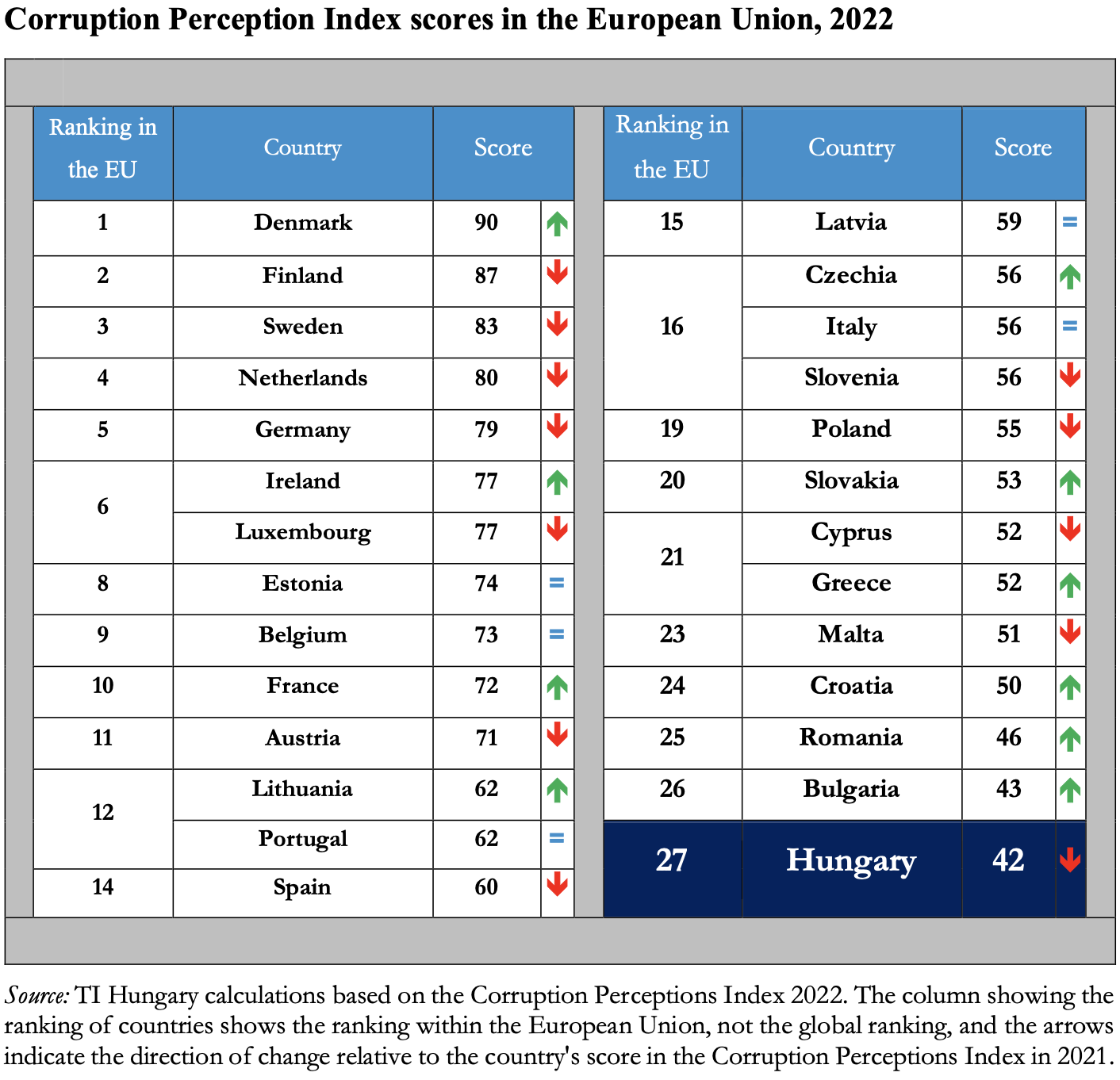Hungary the Most Corrupt Country in EU According to TI

Hungary is the most corrupt EU Member State, according to Transparency International's (TI) 2022 Corruption Perceptions Index.
According to the latest results of the Corruption Perceptions Index (CPI), the corruption situation in Hungary has deteriorated: in 2022, Hungary scored 42 points on a scale from 0 (most corrupt) to 100 (least corrupt), ranking 77th out of 180 countries, down one point and four places compared to the previous year. This can be considered a medium performance globally, but within the European Union, Hungary has slipped to last place.
Hungary's results are worse than those of the countries that are considered its direct regional competitors. The Czech Republic and Slovenia, together with other European countries, reached 41st place with 56 points. Poland ranked 45th with 55 points, Slovakia 49th with 53 points, and Croatia 57th with 50 points in TI’s corruption ranking.
While in 2012 Hungary was ranked 19th, its performance deteriorated in a trend-like fashion. By 2022, Hungary has lost the minimal lead it had a year earlier against the poorest country of the EU: Bulgaria improved somewhat, while Hungary’s position worsened. Overall, Hungary’s ranking in the world corruption index has decreased the most in the last 10 years.
Due to the long lead time of the survey, the impact of the government measures to free up EU funds is not yet reflected in the latest Corruption Perceptions Index results, TI says.
"Corruption is making the world we live in a more dangerous place. Weak government action against corruption has also increased the risk of violence, putting citizens at risk. The only way out of the current situation is for governments to take up the fight against corruption, standing up to guarantee the well-being of society as a whole, not just a narrow elite," said Delia Ferreira Rubio, Chair of TI.

In parallel with the presentation of the Corruption Perception Index, TI Hungary also published its annual report on corruption, which comprehensively analyzes the state of the rule of law, public procurement, and the use of EU funds, as well as the impact of corruption on economic performance.
Among the most significant developments in 2022 is the fact that for the first time in the history of the EU, the European Commission has launched a rule of law procedure against Hungary after the parliamentary elections in April, tying the availability of EU funds to conditions - states the section on the rule of law in TI Hungary’s Report.
The report states that the steps taken under EU pressure and designed to curb the misuse of EU funds can be considered the only serious anti-corruption measures of Hungary's NER (System of National Cooperation) period.
"If the commission rigorously monitors the implementation of the new rules, misuse of EU funds can be expected to decrease in the future, but the institutional destruction of the last decade will not be undone and the rule of law will not be restored "in one fell swoop", said József Péter Martin, executive director of TI Hungary, presenting the Corruption Perceptions Index results and TI Hungary’s report.
TI Calls Public Procurement and Distribution of EU Funds 'Hotbeds of Corruption'
Although Hungary has been one of the largest beneficiaries of the EU budget, the inflow of money has not contributed to increased efficiency or economic activity measured by the number of businesses, inequalities have not decreased either, but corruption has increased, TI Hungary argues.
TI Hungary’s report concludes that the economic weight of public procurement in Hungary remains significant, while the system’s exposure to corruption is high. The European Commission has repeatedly drawn attention to the high rate of single-bid tenders in public procurement, which significantly reduces the intensity of competition. The 35% rate of single-bid tenders in procurements above the EU threshold remains well above the EU target of 15%. The competitive conditions for obtaining public contracts are further worsened by the fact that the most important procurements are regularly exempted by the government from traditional public procurement procedures, for example on the pretext of the coronavirus epidemic, or for reasons of national security.
TI says that last year was no exception: concessions launched in previous years that went against EU legislation were closed, usually with winners close to the government (for example, two concessions for waste management and for the operation of freeways, both for 35 years).
Hungary became the most corrupt country in the EU despite strong economic growth in the seven years leading up to the coronavirus epidemic, according to the chapter on economic trends in TI Hungary’s report. As in previous years, there remains a strong correlation between national income and corruption in the EU. Hungary is stuck in the EU’s lower league of member states with low national income by EU standards, despite the fact that its gross domestic product (GDP) per capita increased by as much as 39% between 2013 and 2022. The main reasons why Hungary failed to improve its position among the EU countries are the destruction of the rule of law and systemic corruption, TI says.
According to news site Telex, the Government Information Center dismissed TI's findings, saying that "It is interesting that Transparency International did not investigate the Brussels bureaucracy or the European Parliament, they were left off the list."
The Government Information Center also called TI a member of the "Soros network", which they accused of being behind the corruption scandals in Brussels and funneling money to the Hungarian opposition.
"This network finances the campaign of the domestic and international left and serves it with all its lying reports," a letter by the center read.
SUPPORT THE BUDAPEST BUSINESS JOURNAL
Producing journalism that is worthy of the name is a costly business. For 27 years, the publishers, editors and reporters of the Budapest Business Journal have striven to bring you business news that works, information that you can trust, that is factual, accurate and presented without fear or favor.
Newspaper organizations across the globe have struggled to find a business model that allows them to continue to excel, without compromising their ability to perform. Most recently, some have experimented with the idea of involving their most important stakeholders, their readers.
We would like to offer that same opportunity to our readers. We would like to invite you to help us deliver the quality business journalism you require. Hit our Support the BBJ button and you can choose the how much and how often you send us your contributions.









